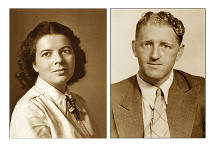

Adie Israel, Obituary |
||
|
Adie and I go back a long way - 65 years in fact. It was 1937 when we first met, both fresh from school and at the beginning of our studies in Architecture at Witwatersrand University. We came there from very different backgrounds. I had been born in Johannesburg and had lived there all my life; he had come as a young refugee from Eastern Europe, and grown up in a Free State village. Somehow, from that time on, it seemed as though our lives were mysteriously linked together - not quite like twins but more like trains on parallel tracks, sometimes alongside one another, sometimes diverging, and then coming back together again. We studied together part-time at University while working part time in different architectural offices. At University we came into contact with the same left-wing and radical influences; we had the same beginners' lessons in politics and Marxism; we became involved together painting banners in the University studios for May Day and other radical demonstrations; we worked together from time to time building decorated floats for political processions. We completed our course, and graduated on the same day in the early months of the World War. Work for aspiring young architects had dried up, and we both turned to other fields. I went to work for the Communist Party in Johannesburg, and Adie - in circumstances I no longer remember - went to Durban and worked full-time for the Communist Party there. Somehow, we reached a simultaneous decision that it was time to join the army. Adie had returned to Johannesburg by that time. We went down to the recruiting office together and signed on; we were sent off together to the Army training camp at Potchefstroom together, shared the same tent, and in due course were passed out and were sent off to join our regiments - only this time separate regiments in separate places. For the rest of the war, we met up only occasionally and purely in passing. When we were eventually demobilised, we both decided for ourselves that we would not return to full time politics. I went back to the firm I had been with during my University days, and Adie went elsewhere. I no longer recall how it happened but some months later Adie left his employers and came over to work in my own place. We worked alongside each other there for several years, improving our skills, acquiring practical experience and achieving seniority in the firm. In due course and on the same day, we were both offered partnerships in the practice, and worked as partners for several years. Until, for reasons of my own, I decided to leave the partnership and set out on my own. Adie decided to remain where he was. |
This was 1956. Our tracks separated, even further than anyone could have anticipated. I became caught up in a long-running trial on a charge of Treason, and almost lost touch with Adie and his more regular life. For months we scarcely saw each other. And then, a few days after the great Sharpeville massacre, we were both arrested in the night without warning. We were held together, without charge, under Emergency Regulations - first in the Johannesburg Fort and then in Pretoria Local Jail. As the State of Emergency subsided, detainees were released in dribs and drabs. Adie was released some weeks, perhaps even months before me. By the time I was freed and could return home, I think he and Rochelle had decided that the future was too menacing. They had already left for a new life in Britain. For a long time we lost touch, until once again I was caught up in the country's political troubles. I was again imprisoned, tried in what has become known as the Rivonia Trial, and found not guilty. In the atmosphere of fear and conflict which existed in the country, we too came to the decision that the time had come for us to leave. In haste. We arrived in Britain almost accidentally. Our children were still in South Africa. We had nowhere to live save temporary lodging with friends; no money, no employment, and no planned future. We were in deep distress; and Adie came to our rescue even though he was himself still struggling to make a new life in this foreign land. He had a minimal and temporary home, but took time off from his own life to help my search for accommodation. He found us our first accommodation of our own in England. His embryo architectural practice was still struggling, but he handed over small slices of work for me to be able to earn something to keep me going. He helped me find permanent employment, and even insisted on taking me to the West End to buy a raincoat - which I could not afford - thus saving my health and possibly my life from my first English winter. All of this was so typical of Adie. He was one who was always there to volunteer help; always there prepared to do what needed to be done for others in times of need. That is how I will always remember him. He expected nothing in return, and asked for no reward. It has been a privilege to have had a friend of that quality for so many years of my life. Everyone should be lucky enough to have friend like Adie. His death will leave a great emptiness in the lives of all his friends, and an even greater sense of loss amongst his family. We will remember him for what his friendship has meant to us in the worst of times. Our lives will be the poorer for his passing. Rusty Bernstein, April 2002. |
|